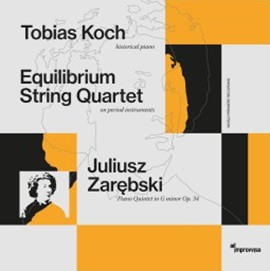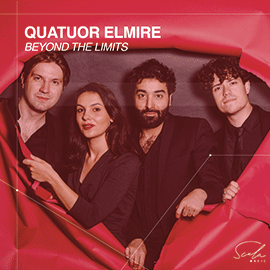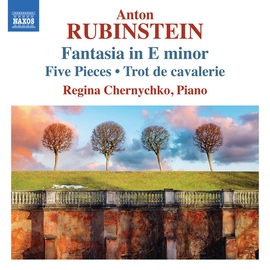Die vierteilige Fantasie e-Moll von Anton Rubinstein (1829-1894) füllt zwei Drittel dieses Albums. Es ist ein durch und durch romantisches Werk mit ruhigen und meditativen sowie virtuosen Passagen. Die ukrainische Pianistin Regina Chernychko spielt schwungvoll, aber nie so, als wolle sie durch pure Virtuosität glänzen. Ihr Siel ist auch nie hart, sondern eher weich timbriert. Mit gemäßigtem Rubato belebt sie die Musik, um ihre romantische Ausdrucksvielfalt wirkungsvoll werden zu lassen.
Die Fünf Klavierstücke, Caprice, Nocturne, Scherzo, Romance und Toccata, haben eine ähnliche romantische Tiefe, und die technischen Anforderungen sind für den Interpreten herausfordernd.
Chernychkos Interpretation betont die lyrischen und poetischen Qualitäten der Musik. Das warme Klangbild der Aufnahme kommt diesem Ansatz entgegen.
Das Album endet mit Trot de Cavalerie, den die Pianistin mit rhythmisch akkuratem und detailreich klarem Spiel sehr charakteristisch werden lässt.
Anton Rubinstein’s (1829-1894) four-part Fantasy in E minor fills two-thirds of this album. This thoroughly romantic piece features calm and meditative passages, as well as virtuoso ones. Ukrainian pianist Regina Chernychko plays with verve but never in a way that makes it seem like she wants to shine through pure virtuosity. Her playing is soft in timbre and never harsh. With moderate rubato, she brings out the music’s romantic expressive diversity to great effect.
The five piano pieces – Caprice, Nocturne, Scherzo, Romance, and Toccata – have a similar romantic depth, and the technical demands are challenging for the performer.
Chernychko’s interpretation emphasizes the music’s lyrical and poetic qualities. The warm sound of the recording complements this approach.
The album concludes with Trot de cavalerie, which the pianist renders distinctive through her rhythmically precise, clear, and detailed performance.























